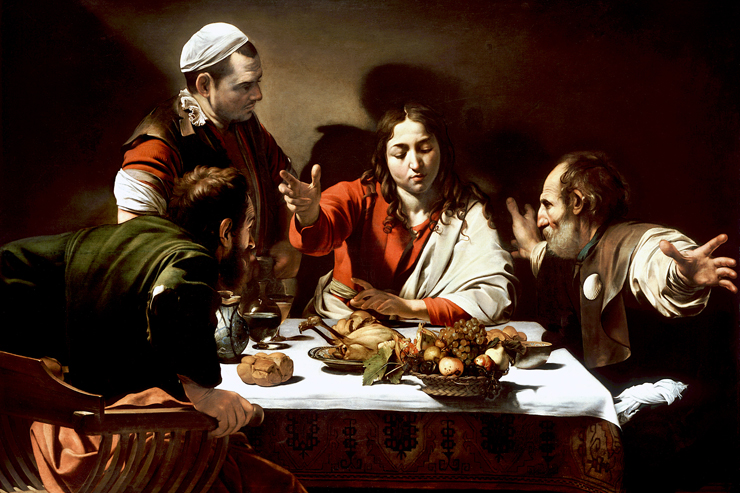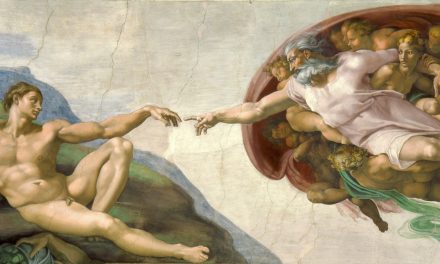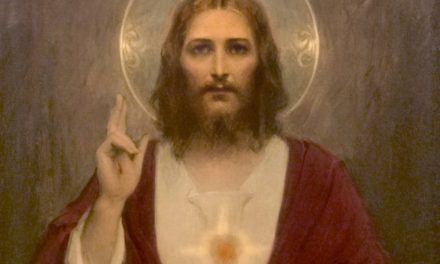Four elements stand out in the traditional Catholic doctrine of what a sacrament is. Fundamentalism is suspicious of all four. A sacrament is “a sign that effects what it signifies, instituted by Christ to give grace.”
1. Sacraments are signs and symbols.
Fundamentalism is temperamentally wary of symbolism. It has a plain, “no-nonsense” mentality. Symbols are too poetic for its hardheaded mind to grasp, whether in Scripture or in sacrament.
2. Sacraments effect what they signify.
They’re both signs and things. They thus overcome the “either-or” that plagues Scripture scholarship, the assumption that any given passage must be either interpreted literally or symbolically, not (as in Aquinas) both.
Yet according to Aquinas, since God is the author of history, historical events can signify as well as effect. For example, the parting of the Red Sea both effected salvation from Egypt for Israel and also signified salvation from sin and death through Christ. Fundamentalists resist symbolism in considering historical events, and resist “real presence” and effects when considering sacramental signs. “This is my body” they interpret as wholly symbolic, merely symbolic; yet most of the rest of Scripture they see as not symbolic at all.
3. Sacraments were instituted by Christ.
Fundamentalists agree, but limit sacraments to Baptism and the Eucharist (which they call “The Lord’s Supper”). But the question immediately arises: How do you know whether a sacrament has been instituted by Christ or not? How do you know He didn’t intend foot-washing to be a sacrament? (See John 13:1-15.) How do you know how many sacraments He instituted? You need His Church to teach you, to define and sort out the sacraments. (This was not done explicitly for all seven sacraments until the 11th century.
4. Sacraments give grace.
They “work.” In fact, they work ex opere operato, out of themselves rather than out of and caused by the subjective dispositions of the recipient. They’re like physical food: Spinach gives you iron because of what spinach is, not because of what you are. Sacramental grace is real, objective, ontological.
Answering Three Common Fundamentalists Objections
This last feature is the thing fundamentalists object to most. It seems like magic to them. We hear three basic criticisms about sacraments from fundamentalists: It seems to them that Catholic doctrine is magic, externalism and pagan superstition.
First, fundamentalists misunderstand ex opere operato. To say sacraments are like magic in one way (objective, not subjective) is not to say they are like magic in other ways. Magic is impersonal and automatic, but sacraments are like gifts. They come from the giver (God), not the receiver (us), but they must be freely accepted in order to be received.
Fundamentalists often use arguments like this: “According to Catholic doctrine, if the water in Baptism fails to touch the forehead of the baby, by some accident, then if the baby dies it goes to hell or limbo, not heaven; and if a man about to confess a mortal sin is run over by a truck on his way to confession, he goes to hell rather than purgatory or purgatory rather than heaven; now isn’t that ridiculous?” (Fundamentalists also usually misunderstand purgatory, by the way; they think it is eternal rather than temporary.)
Fundamentalists already have, in their theology of salvation, the principle for understanding sacramental grace. Salvation is a gift of God (objective) yet it must be freely accepted by man (subjective) in order to “work.”
In Catholic theology “the baptism of desire” brings the same grace that water baptism brings, and a sincere intention to confess counts in the eyes of God just as a confession itself does.
Not only must there be the subjective element of desire and choice and intention added to the objective element of the matter of the sacrament, but if the objective matter of the sacrament is unavoidably absent, the subjective intention alone can make up for it. Fundamentalists do not know this about Catholic theology. That’s mainly because nearly all fundamentalists rely on a single, badly misinformed book by Lorraine Boettner for their anti-Catholic criticisms rather than reading the official Catholic documents.
A second criticism is that Catholic sacraments direct attention outward to externals and distract attention from the heart and spirit, which are where God is to be found. Fundamentalists always see a tension, even a contradiction, between sacramentalism and personal piety. It seems to them that the more sacramental a religion is, the less pious its believers are; and the more personal piety a religion has, the less sacramental it is.
There are several replies to this. First, God deliberately made sacraments external to free us from “ingrown eyeballs” and subjectivism. The fact that the sacrament is external to us aids devotion because it takes us out of ourselves; it makes us trust in God.
Second, sacraments aid devotion by being a test of faith. We believe not because of appearance, or evidence, or experience, or feeling, or reasoning, but simply by divine authority. As Thomas Aquinas so beautifully put it in his hymn to the Eucharistic Christ:
Sight, taste and touch in Thee are each deceived; The ear alone most safely is believed I believe all the Son of God has spoken; Than Truth’s own word there is no truer token.
Third, external sacraments overcome our materialistic tendency to think of everything real outside our own consciousness as matter, to think of spirit as subjective and matter as objective, thereby making God subjective rather than objective. (If you know Descartes, you’ll see how very modern fundamentalism is. It buys into the fundamental modern dualism of Descartes’ matter or spirit.)
A third fundamentalist objection to Catholic sacramentalism is that it is really pagan superstition. It is naturalistic and grants too much spiritual power to matter — like the pagans, who thought trees housed nymphs and storms were raised up by gods. Fundamentalists often accuse Catholics of softening the Creator-creature distinction by raising subhuman creatures (water, bread, wine) up to have divine powers in the sacraments.
The Catholic reply is that paganism is profoundly right here in its basic intuition (though not, of course, in its idolatrous details). Matter is much more than moderns (including fundamentalists) think it is. Catholics have not only sacraments but a whole sacramental worldview. That’s why they build cathedrals.
It’s instructive to watch fundamentalists in a Gothic cathedral. They usually look uncomfortable and guilty, as if it were sinful to beautify matter so much and to enjoy material beauty so deeply. At best, they look wistful and envious. They wonder why they don’t build cathedrals. The answer is that cathedrals were built not to house Catholics but to house the Eucharist.
The ultimate answer to fundamentalists’ criticism of the sacraments is Christ. If it’s impious or impossible for matter to be raised to such heights of power in sacraments, what was it raised to in Christ? Why not criticize the creeds’ doctrine of Christ as too pagan and superstitious? Is it naturalism to bring God down to man and matter? Is it too superstitious, too supernaturalistic an attitude to take toward matter to think it can be raised to the level of being the very body of God incarnate? Is it too low for God to be man and too high for man to be God? Is it too low for spirit to be joined to matter and too high for matter to be joined to spirit in a human being who is both body and soul?
Just before Christ instituted the Eucharist, according to John’s Gospel, He washed His disciples’ feet. The Incarnation itself was like Atlas stooping to raise the whole world to heaven on his shoulders. Christ’s death and burial were the supreme example of this divine lowering for the sake of human raising. That’s just the way God is; sacraments show His amazing humility. It’s unintentional pride, even a kind of snobbery of the spirit, for fundamentalists to feel sacraments are too pagan, too naturalistic, too material.
I vividly remember how hard it was for me to overcome that feeling after my own conversion. My mind had accepted the whole of Catholic doctrine, but sacramentalism was the one thing my Protestant instincts had the most trouble digesting. The thought that this wafer of bread was really God’s body was just too staggering for me.
But not for God. He “stoops to conquer.” And we must stoop to be conquered. The greatest saint is like a baby bird opening its mouth for its mother to fill it. Catholics are feasted by Mother Church. Fundamentalists choose to diet.
Excerpted from Dr. Kreeft’s, Fundamentalists — as appeared in National Catholic Register (1988).














